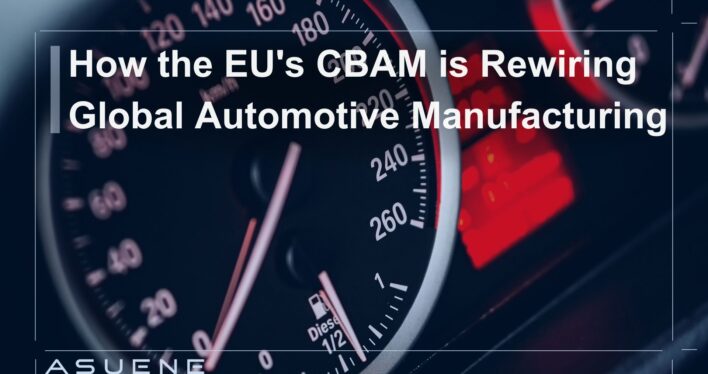- Article Summary
-
Overview: Why CBAM Matters for Auto Supply Chains
The EU’s Carbon Border Adjustment Mechanism (CBAM) introduces a carbon price on imported goods, ensuring that foreign products face the same climate costs as those made in the EU. While it begins with raw materials like steel and aluminum, the impact will ripple across entire industries; especially automotive manufacturing.
Modern vehicles rely on carbon-intensive components such as chassis, engines, and battery casings. As CBAM moves toward full enforcement in 2026, automakers and suppliers around the world must prepare for rising costs and stricter reporting requirements.
Understanding CBAM and the Need for Carbon Accounting
CBAM works by applying EU-equivalent carbon costs to imported goods. That means exporters to the EU and their suppliers must calculate and report embedded carbon emissions for every material used. This includes emissions from extraction, processing, transport, and assembly.
For the auto sector, this is a complex task. A car can have over 30,000 parts, sourced globally, each contributing to the vehicle’s carbon footprint.
This complex challenge can be addressed using modern carbon management platforms. These systems help companies calculate emissions across all scopes: Scope 1 (direct emissions from owned operations), Scope 2 (indirect emissions from purchased energy), and Scope 3 (all other indirect emissions, such as those from suppliers or logistics). They also facilitate the collection of emissions data from a wide range of suppliers, ensuring that automotive companies can trace carbon throughout their entire supply chain. Moreover, these platforms provide the documentation and transparency required to meet CBAM compliance standards, helping companies prepare for regulatory audits and avoid penalties.

Materials at Risk Under CBAM
- Steel: Used in frames and safety parts. High emissions, especially from India and China.
- Aluminum: Common in EVs. Emissions depend on electricity source; cleaner in Canada than China.
- Plastics and Rubber: Not yet included in CBAM but may be in the future.
| Material | Country | Emissions (kg CO2e/ton) |
|---|---|---|
| Steel | India | 2,700 |
| Steel | EU | 1,800 |
| Aluminum | China | 14,000 |
| Aluminum | Canada | 2,000 |
Global Impact: Who’s Most Exposed?
EU OEMs: Benefit long-term, but face near-term audit and compliance costs.
U.S. Automakers: Mixed exposure; reliant on CBAM-affected suppliers.
China & Southeast Asia: High carbon intensity means higher CBAM costs.
Japan: Efficient but still exposed. Companies like Toyota and Denso are already shifting to low-emission materials.
Industry Response: Building Resilient, Low-Carbon Supply Chains
In response to CBAM, the automotive industry is proactively transforming its supply chain strategies. Companies are increasingly turning to localized sourcing to reduce their exposure to carbon-related import costs. By procuring materials closer to production hubs within the EU or from countries with lower carbon footprints, manufacturers aim to mitigate the financial and compliance risks associated with CBAM.
Additionally, there is a growing investment in green materials. Automakers are seeking suppliers that produce steel using hydrogen-based processes and aluminum that is either recycled or smelted using renewable energy. These efforts not only reduce emissions but also position brands as sustainability leaders.
Conclusion: Why Carbon Accounting is a Must
CBAM is changing the rules of trade. Carbon content now influences market access as much as cost and quality.
Automotive exporters must adapt by measuring, reducing, and proving their emissions. By adopting effective carbon management systems, they can simplify this challenge and seize the opportunity to lead in a greener global economy.
Because in this new era of manufacturing, carbon accounting isn’t optional. It’s essential.
Why Work with ASUENE Inc.?
Asuene is a key player in carbon accounting, offering a comprehensive platform that measures, reduces, and reports emissions, including Scope 1-3, with expertise in decarbonization. Asuene serves over 10,000 clients worldwide, providing an all-in-one solution that integrates GHG accounting, ESG supply chain management, a Carbon Credit exchange platform, and third-party verification.
ASUENE supports companies in achieving net-zero goals through advanced technology, consulting services, and an extensive network.


